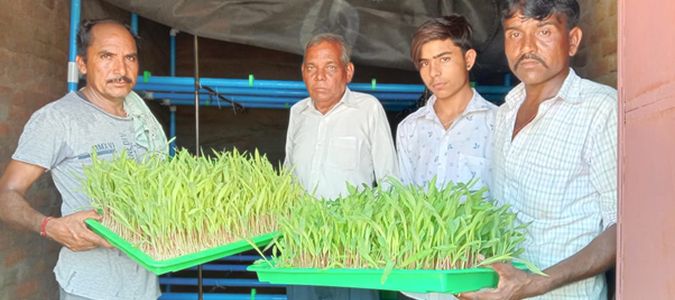
India

A group of farmers displaying full-grown maize fodder at Kalu, Common Facility Center (CFC), Bikaner
Photo: Via Desert Resource Center
Situated in the extreme western margins of India, Urmul Seemant Samiti has been working since 1994 in empowering village communities. The main areas of interest have been villages located near the Indo-Pak border in the Bikaner and Jaisalmer districts of Rajasthan. Developing a safe and enabling environment for people that ensures their right to health, education and employment has been at the core of the organisation’s objectives. With an added focus on women and children who are at the receiving end of discrimination and exclusion, Urmul Seemant Samiti is focussed in building resilience and implementing sustainable development services for the desert communities.
The western region of Rajasthan is hot and arid and receives an erratically distributed annual rainfall of less than 50 to 100 mm. Temperatures vary between 45-50 degrees in summers and fall below freezing points in winters. Historical climate record for the century suggests that the drought cycle has increased over the years giving rise to harsh living conditions in the desert.
Urmul Seemant Samiti’s innovative and sustainable project aims to create an inclusive programme for rural development that focuses on livestock management and green fodder production in Rajasthan. The major aim of this project is to promote soil-less cultivation using the technique of hydroponics in a desert environment, thereby paving way for rural employment opprtunities with the required skill development. Hydroponic fodder can prove to be an excellent option to improve dairy income by about 15% even during dry and drought conditions.
Through this project, Urmul Seemant Samiti will work closely with:
- Women involved in livestock
- Farmers
- Camel and cow herders
The key activities within the project include:
- Construction of polyhouses using local materials
- The institutionalisation of micro-entrepreneurship/ strengthening the self-help group (SHG)
- Building a forward linkage by creating market networks
Key Project Staff

Romal Singh anchors the Agro Dairy value chain at Urmul in collaboration with the marginalised community of western Rajasthan to strengthen partnerships in pursuit of building a community-owned institution. He has been driven towards tracing the well-being and prosperity of the farming community in the Thar desert. He believes in synergies and cooperation that ensures flexibility to accomplish multitasks. He is a dedicated youth steadfast in creating a sustainable entrepreneurial ecosystem for the community by engaging with youth, women and herders of Rajasthan.

Pratikshya Waghmare is an agroecologist and an agrology researcher at Urmul. A graduate in agriculture and an urban fellow, she is keen to work and dive deeper into sustainable rural agriculture and climate-resilient practices in the harsh conditions of the desert. Through the Agro Dairy Knowledge interventions, her primary focus is addressing the desert-centric social entrepreneurship through various interventions in the Thar Desert.
